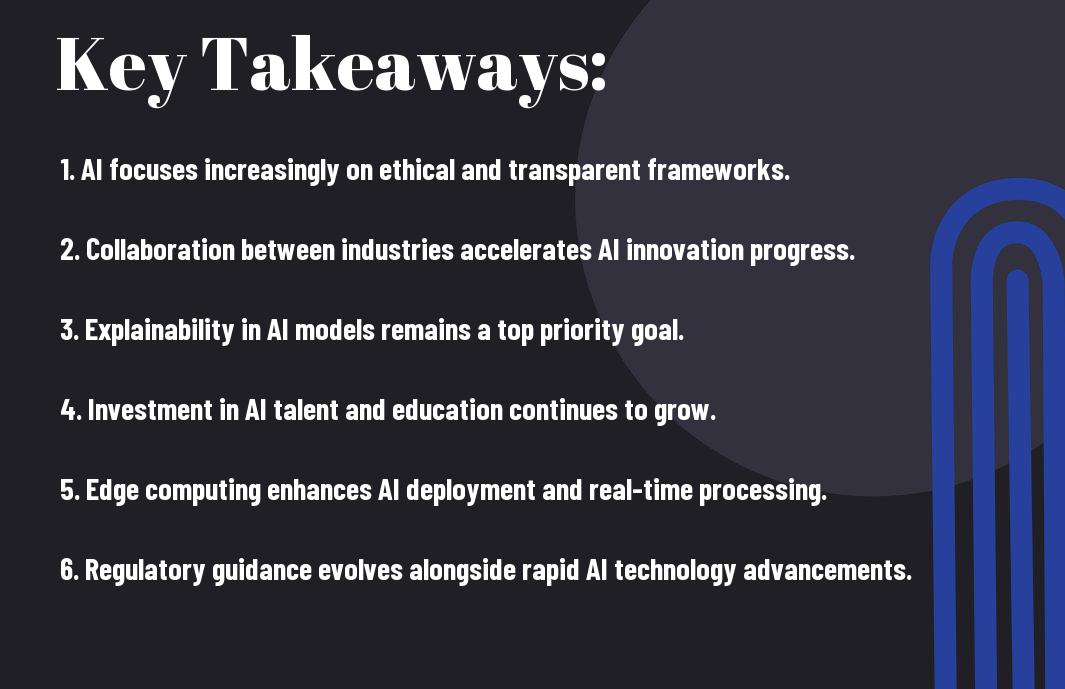With the rapid evolution of artificial intelligence, it’s crucial for you to stay informed about the latest trends shaping the field. Industry leaders are weighing in on the positive impacts AI can have on various sectors, as well as addressing the potential hazards that come with its development. By understanding these insights, you can make informed decisions about your involvement in AI initiatives and leverage emerging opportunities while safeguarding against risks. Dive into this post to uncover valuable perspectives that can guide your approach to AI.
The Race for Innovation: Key Players in AI Development
The competitive landscape of AI development is marked by a variety of players striving for dominance in this rapidly evolving sector. Industry giants like Google, Amazon, and Microsoft are investing significantly in artificial intelligence capabilities, racing to deliver innovative solutions that enhance their platforms and improve services. Startups also play a vital role, bringing fresh ideas and nimble structures that can disrupt traditional models, pushing established companies to adapt swiftly to stay relevant.
Major Companies and Their Transformational Projects
Leading companies are not just adopting AI; they’re actively spearheading revolutionary projects. For instance, Google’s DeepMind is making headlines with advancements in reinforcement learning, while Amazon’s Alexa continues to enhance its natural language processing capabilities. Microsoft integrates AI across its product suite, from Azure services to Office applications, ensuring that AI becomes a cornerstone of business efficiency and user experience.
Startups Disrupting Traditional AI Landscapes
Emerging startups are redefining the AI ecosystem with innovative solutions that challenge the status quo. Companies like OpenAI and DataRobot bring unique algorithms and tools designed to democratize AI, making it more accessible for businesses of all sizes. These startups are not only providing cutting-edge technology but also showcasing how tailored AI applications can cater to specific industry needs, bringing agility and creativity to an otherwise traditional domain.
For instance, startups like Hugging Face are revolutionizing natural language processing by offering open-source tools that enable developers to create and deploy models quickly. Similarly, firms such as UiPath focus on automation technologies, streamlining operational workflows for organizations, thus empowering them to utilize AI without extensive resources. The flexibility and innovative spirit of these startups often force larger corporations to rethink their strategies and foster a culture of rapid experimentation and adaptation, setting a new standard in the AI industry.

Navigating Ethical Dilemmas: Balancing Progress with Responsibility
The rapid evolution of AI brings significant ethical dilemmas that demand careful consideration. Leaders in the industry stress the need for a balance between innovation and accountability. As algorithms become integrated into every aspect of life, from healthcare to criminal justice, the potential for bias and discrimination raises serious concerns. You must prioritize ethical frameworks to ensure responsible AI development that aligns with societal values while fostering progress.
Industry Leaders’ Perspectives on Ethical AI
Industry leaders advocate for ethical AI that aligns with humanity’s best interests. For instance, Google’s AI Principles emphasize the importance of avoiding bias, ensuring privacy, and promoting fairness. You’ll find that discussions around ethical AI often center on incorporating diverse voices and perspectives throughout the development process. Stakeholders from various backgrounds significantly improve AI outcomes, steering clear of unintended consequences.
Frameworks for Sustainable AI Development
Creating frameworks for sustainable AI development involves establishing clear guidelines and practices to navigate ethical challenges effectively. Powerful organizations, such as the Partnership on AI, provide resources and best practices that support responsible AI initiatives. These frameworks not only facilitate compliance with regulations but also foster an environment of trust among users and stakeholders.
Frameworks like the ones proposed by Partnership on AI serve as a blueprint for organizations to develop AI systems responsibly. Incorporating ethical considerations throughout the AI lifecycle—from conception to deployment—ensures fairness, accountability, and transparency. This proactive approach minimizes risks associated with algorithms, like reinforcing societal biases, while maximizing the societal benefits of AI technology. Embracing these frameworks, your organization can help create a balanced approach to AI development that addresses both innovation and ethical responsibility effectively.
Driving Forces Behind AI Trends: Emerging Technologies and Tools
Advanced technologies are driving the latest AI developments, enabling systems to learn and adapt with unprecedented capabilities. Innovations like natural language processing and computer vision have become more accessible due to the rise of cloud computing, allowing your processes to leverage powerful algorithms without needing extensive resources. Additionally, the integration of AI with IoT devices is enhancing data collection and analysis, ensuring your operations become smarter and more efficient over time.
The Role of Quantum Computing in AI Evolution
Quantum computing stands to revolutionize AI by performing complex calculations at speeds unattainable by classical computers. This technology allows for the simultaneous processing of vast data sets, offering breakthroughs in optimization problems and machine learning algorithms. As quantum systems evolve, expect your AI capabilities to expand dramatically, propelling industries into new realms of innovation and efficiency.
Machine Learning Advancements Reshaping Industries
Recent strides in machine learning are transforming industries from healthcare to finance, allowing for enhanced predictive analytics and automated decision-making. For instance, in healthcare, AI models predict patient outcomes with up to 95% accuracy, streamlining treatment plans. In finance, fraud detection systems now analyze transactions in real-time, reducing losses by over 30%. These advancements empower you to make smarter, data-driven decisions, improving operational efficiency and enhancing customer experiences.
In the finance sector, algorithms capable of analyzing large sets of transaction data thwart emerging threats more effectively than manual processes, slashing response times and improving accuracy. Meanwhile, machine learning in retail offers personalized recommendations based on consumer behavior, driving up conversion rates. The manufacturing sector benefits through predictive maintenance powered by AI, forecasted to save companies billions by reducing downtime. No matter the industry, embracing machine learning advancements provides a competitive edge in today’s digital marketplace.
Workforce Revolution: Preparing for an AI-Driven Future
AI is not just reshaping industries; it’s redefining the workforce landscape. Preparing for an AI-driven future requires a proactive approach, focusing on the skills and capabilities that will be in demand. According to 5 AI Trends Shaping Innovation and ROI in 2025, businesses must invest in hybrid skills blending technical proficiency with soft skills to thrive in a data-centric world.
Skills Gap: What Professionals Need to Succeed
Identifying and bridging the skills gap is vital for your professional growth in an AI-augmented workplace. As AI technologies evolve, you must develop competencies in areas like data analysis, machine learning, and robotics, along with enhancing your problem-solving and collaboration abilities. Upskilling through targeted education initiatives or professional development programs will position you favorably in the job market.
The Importance of Continuous Learning and Adaptation
Continuous learning is your strategy for staying relevant in an AI-driven environment. The rapid pace of technological advancement mandates that you regularly update your knowledge and adapt your skillset. Engaging in courses, networking events, and industry conferences focused on AI helps you stay ahead of trends. Furthermore, organizations recognize the value of adaptable employees, often supporting further education to maintain a competitive edge.
Adapting is not limited to acquiring new technical skills; it also encompasses developing a growth mindset. This mindset enables you to embrace change and tackle challenges proactively, whether adapting to new software tools or shifting team dynamics influenced by AI integration. Case studies from companies that prioritize employee adaptability have shown improved innovation, employee satisfaction, and overall performance. Cultivating an attitude of lifelong learning empowers you to navigate and leverage the disruptions that AI will continue to bring to the workplace.

Predictions and Future Directions: What Comes Next in AI?
As AI technology continues to evolve, industry leaders anticipate significant advancements that promise to reshape various sectors in the near future. Innovations like AI-enabled software development fuels innovation, will streamline processes and enhance productivity. Expect a surge in AI applications that not only automate tasks but also enhance decision-making, leading to smarter and more efficient systems across industries.
Insights from Industry Leaders on Upcoming Trends
Industry leaders emphasize that AI will increasingly integrate with emerging technologies such as blockchain and IoT, paving the way for interconnected solutions. Notably, predictions indicate a shift toward personalized AI experiences, where systems adapt to individual user preferences, enhancing engagement and satisfaction. This transformation will be driven by growing data accessibility and advancements in machine learning algorithms, making the systems more intuitive than ever.
The Impact of AI on Global Markets in the Next Decade
In the next decade, AI is set to have a profound impact on global markets, with estimates suggesting it could contribute $15 trillion to the global economy by 2030. Sectors such as healthcare, finance, and retail will particularly benefit, allowing for enhanced productivity and reduced operational costs. As businesses harness the power of AI to automate processes, labor markets will also evolve, necessitating new skill sets and potential job displacement in traditional roles. Conversely, job creation in AI-related fields is expected, driving innovation and fostering economic growth, fundamentally changing market dynamics.
To wrap up
Summing up, as you probe into AI development trends shared by industry leaders, it’s vital to embrace the dynamic nature of this field. You should stay informed about emerging technologies, ethical considerations, and interdisciplinary collaborations that are shaping the future of AI. By understanding these insights, you can position yourself strategically within the industry, ensuring that your skills remain relevant and your contributions impactful in this ever-evolving landscape.











